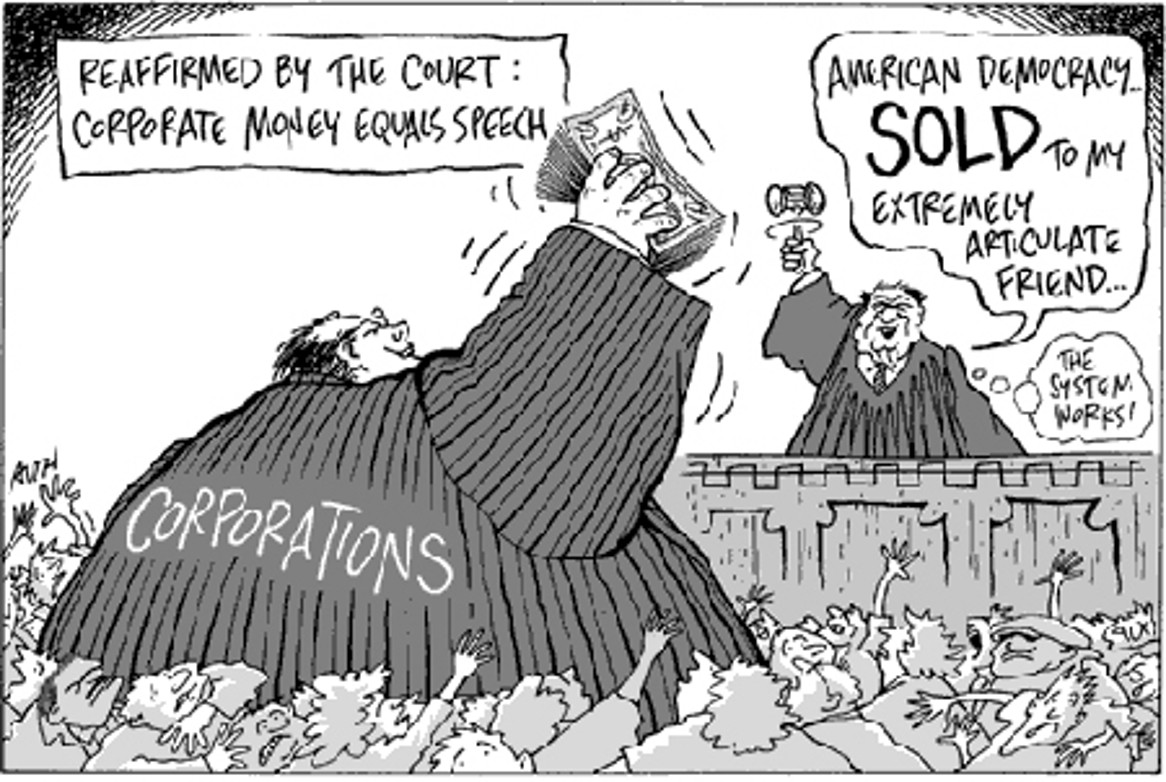
Neither option is particularly palatable. or allow them carte blanche over policy and exacerbate social problems like the artificially-inflated labor supply, minimal tax revenue from a strangled middle class, eroding confidence in the justice system, etc. Force them to comply with the law, address externalities in the cost of their products, and cut off your own nose to spite your face. There's only two options available to lawmakers when it comes to big business. they don't actually care about budget deficits). They mouth pleasantries to keep the "values" voters happy, but the real agenda is to eliminate government interference in business, be it by regulation or taxation. Right-wing parties, in both the US and elsewhere, are commercial interests high-jacking conservative values to gain a non-critical voting pool. They need permanent tax cuts, tax loopholes, and perpetually low-cost labor because they had it in previous quarters, and they're counting on it to maintain their projections going forward. They can't be made to comply with the law, because it would necessitate big layoffs and increase the cost of goods. While all of this sounds like Citigroup is preaching a New World Order philosophy, it's probably nothing more than an attempt to make an appealing sales pitch to rich sociopaths.īig business blackmails the taxpayer. There are only rich consumers and non-rich consumers. There is no such thing as an American consumer, British consumer, Russian consumer, etc.the patenting of inventions (qv: Galambosianism).the rule of law (qv: fascism and totalitarianism).an international dimension of immigrants (qv: income inequality and minimum wage).capitalist-friendly cooperative governments.


creative financial innovation (aka rentier capitalism, qv: the banking crisis and Great Depression).

disruptive technology-driven productivity gains (qv: cornucopianism and technobabble).Past plutonomies include 16th century Spain, 17th century Holland, and the US of the Gilded Age and the Roaring Twenties.plutonomies, where the rich drive economic growth and also consume most of the output of said economies.The world is in the process of dividing into two blocs:.The United States, United Kingdom and Canada are defined as the world's three leading plutonomies.Honestly, just a modern day pump and dump scheme, expanded to a nation-wide scale.Ījay Kapur, a global strategist at Citigroup, coined the term plutonomy, which became public knowledge on 16 October 2005 when Citigroup published a large memo defining the meaning and the scope of the term.

Plutonomies tend to be unpopular and unstable, because they place too much burden on and provide too little reward to those who actually do the work of the economic system ( the non-plutocrats). In order to sell the idea of plutonomy to the citizens of a democracy, plutocrats must convince average citizens that trickle-down economics will not only work, but ultimately make it possible for them to get rich, too. Plutocracy has been a phenomenon since ancient Greeks coined the term, but a modern variant, whose cornerstone policies include government deregulation and reduced taxes on the rich, is now often referred to as a plutonomy. Plutocracy is a form of government designed by smart (but un-named) social engineers to make the rich ( the plutocrats) who control said government even richer. “ ”The Capitalists will sell us the rope with which we will hang them.


 0 kommentar(er)
0 kommentar(er)
